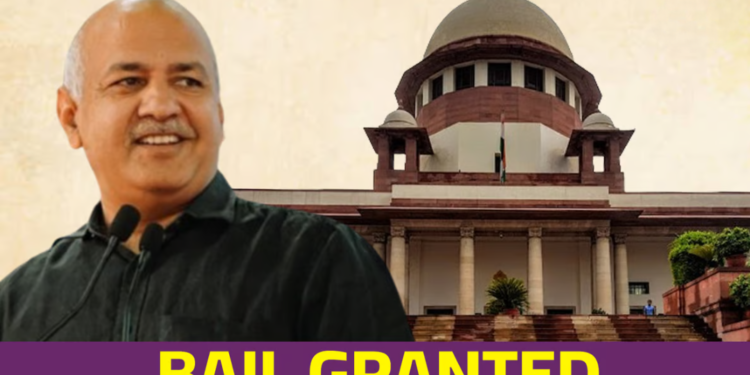On Friday, the Supreme Court granted bail to Aam Aadmi Party (AAP) leader Manish Sisodia in the Delhi Excise Policy case [Manish Sisodia vs Directorate of Enforcement].
The bench, composed of Justices BR Gavai and KV Viswanathan, overturned the Delhi High Court’s decision and granted bail to the former Delhi Deputy Chief Minister in cases filed by both the Central Bureau of Investigation (CBI) and the Enforcement Directorate (ED).
The court ordered, “Appeal allowed. The Delhi High Court order is quashed and set aside. He is granted bail in both ED and CBI cases.”
Sisodia was directed to provide ₹2 lakh as bail bonds, surrender his passport, and report to a police station as part of the bail conditions.
The court noted that the prolonged delay in the trial violated Sisodia’s right to a speedy trial, which is considered a fundamental aspect of liberty under Article 21 of the Constitution. The bench stated, “Right to a speedy trial is a sacrosanct right. In cases of long incarceration, bail can be granted, and the triple test under the Prevention of Money Laundering Act (PMLA) does not apply here.”
The court also dismissed the argument by the ED that the trial delay was due to applications filed by Sisodia, noting that these applications were allowed by the trial court and did not cause frivolous delays.
Justice BR Gavai and Justice KV Viswanathan also stated that it would be unjust to send Sisodia back to the trial court or High Court for bail, referencing a previous Supreme Court order that allowed Sisodia to seek bail after the chargesheet was filed.
The case involves allegations that officials from the Delhi government altered the excise policy to benefit certain liquor vendors in exchange for bribes, which were allegedly used to fund AAP’s election campaign in Goa. Sisodia, who has been in custody since February 26, 2023, had repeatedly filed for bail, leading to this appeal before the Supreme Court.
During the hearing, Sisodia’s counsel, Senior Advocate Abhishek Manu Singhvi, argued that there was no direct evidence against Sisodia and that he had already served nearly half the potential sentence if found guilty. The ED, however, raised concerns about potential evidence tampering and witness influence if Sisodia were released.
The court ultimately decided in favor of Sisodia, granting him bail under specific conditions.

















